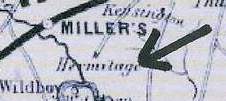Henry McAlphin of
Hermitage Plantation
Early (now Thomas) County
Henry McAlpin was a long-time Charleston, South Carolina resident of his plantation Poplar Grove, 5 miles from the Georgia line. He was born in Scotland and came to America after his estate was lost, through no fault of his own. He mortgaged two plantations for $3500.00 in order to purchase the Hermitage for rice plantation on the Savannah River which contained 400 acres. He later acquired 275 more acres for planting as well as acreage on Argyle Island for rice planting. He was enterprising in business, gaining his fortune through the manufacture of bricks and cast iron products. He also owned timber tracts in Effingham County, and timber was floated down stream to his plantation. Hermitage had a water front garden along the Savannah River, which other colonists copied, as well as a race course where he ran his breed horses.
The original house was previously occupied by Dr. Beecroft, and was replaced by plastered brick and lumber. The new mansion house had a copper roof and columned entrance portico with double curving stairs, and the exterior steps were made of white marble. A mile-long avenue of oaks lead to the Augusta Road, and was called "McAlpin Avenue". Also, there were brick slave huts on the plantation. In 1820, he built the first railroad in the United States. In 1838, he acquired 880 acres of the plantation Mulberry Grove which he sold two years later to Philip Ulmer.
Henry McAlpin became fabulously wealthy from his rice plantations, and entertained lavishly. However, during Savannah's long siege by the British and their damage to the local commerce, his plantation was unable to function, so it was that during the Revolutionary War, his plantation had to be sold on the court house steps. It was his father-in-law, Aaron Champion, who purchased it at public auction. However, it remained in the family because Angus had married a daughter of Aaron Champion. When Henry died in 1851, his son, Angus, was executor of his estate, and in 1854 his named heirs were sons: Angus, James, Wallace and Donald. Angus and his wife resided at the Hermitage, and when Angus left to serve in the Confederate Army, cannon balls crashed into the garden. At that point, his wife and children left.

Hermitage Plantation

